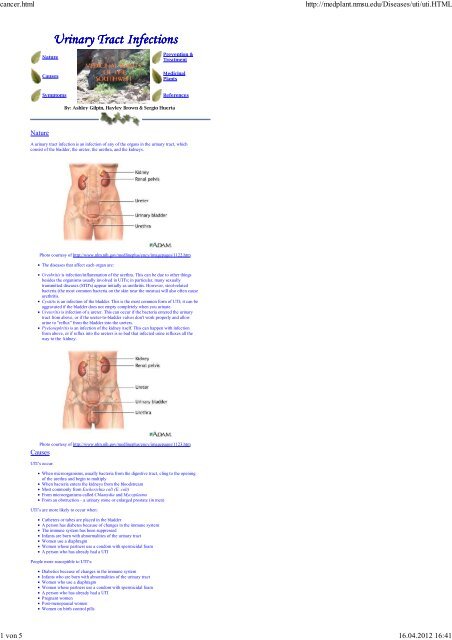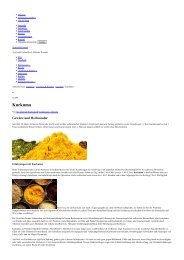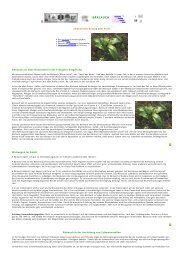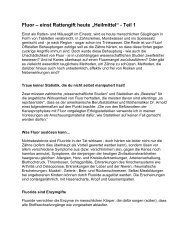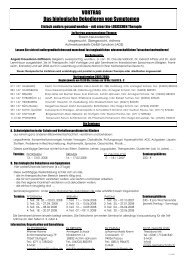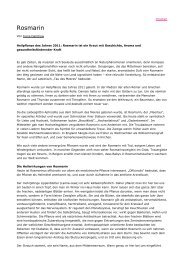Urinary Tract Infections - Zentrum der Gesundheit
Urinary Tract Infections - Zentrum der Gesundheit
Urinary Tract Infections - Zentrum der Gesundheit
Create successful ePaper yourself
Turn your PDF publications into a flip-book with our unique Google optimized e-Paper software.
cancer.html http://medplant.nmsu.edu/Diseases/uti/uti.HTML<br />
Nature<br />
<strong>Urinary</strong> <strong>Urinary</strong> <strong>Urinary</strong> <strong>Tract</strong> <strong>Tract</strong> <strong>Tract</strong> <strong>Infections</strong><br />
<strong>Infections</strong><br />
Nature<br />
Causes<br />
Prevention &<br />
Treatment<br />
Medicinal<br />
Plants<br />
Symptoms References<br />
By: Ashley Gilpin, Hayley Brown & Sergio Huerta<br />
A urinary tract infection is an infection of any of the organs in the urinary tract, which<br />
consist of the blad<strong>der</strong>, the ureter, the urethra, and the kidneys.<br />
Photo courtesy of http://www.nlm.nih.gov/medlineplus/ency/imagepages/1122.htm<br />
The diseases that affect each organ are:<br />
Urethritis is infection/inflammation of the urethra. This can be due to other things<br />
besides the organisms usually involved in UTI's; in particular, many sexually<br />
transmitted diseases (STD's) appear initially as urethritis. However, stool-related<br />
bacteria (the most common bacteria on the skin near the meatus) will also often cause<br />
urethritis.<br />
Cystitis is an infection of the blad<strong>der</strong>. This is the most common form of UTI; it can be<br />
aggravated if the blad<strong>der</strong> does not empty completely when you urinate.<br />
Ureteritis is infection of a ureter. This can occur if the bacteria entered the urinary<br />
tract from above, or if the ureter-to-blad<strong>der</strong> valves don't work properly and allow<br />
urine to "reflux" from the blad<strong>der</strong> into the ureters.<br />
Pyelonephritis is an infection of the kidney itself. This can happen with infection<br />
from above, or if reflux into the ureters is so bad that infected urine refluxes all the<br />
way to the kidney.<br />
Photo courtesy of http://www.nlm.nih.gov/medlineplus/ency/imagepages/1123.htm<br />
Causes<br />
UTI’s occur:<br />
When microorganisms, usually bacteria from the digestive tract, cling to the opening<br />
of the urethra and begin to multiply<br />
When bacteria enters the kidneys from the bloodstream<br />
Most commonly from Escherichia coli (E. coli)<br />
From microorganisms called Chlamydia and Mycoplasma<br />
From an obstruction – a urinary stone or enlarged prostate (in men)<br />
UTI’s are more likely to occur when:<br />
Catheters or tubes are placed in the blad<strong>der</strong><br />
A person has diabetes because of changes in the immune system<br />
The immune system has been suppressed<br />
Infants are born with abnormalities of the urinary tract<br />
Women use a diaphragm<br />
Women whose partners use a condom with spermicidal foam<br />
A person who has already had a UTI<br />
People more susceptible to UTI’s:<br />
Diabetics because of changes in the immune system<br />
Infants who are born with abnormalities of the urinary tract<br />
Women who use a diaphragm<br />
Women whose partners use a condom with spermicidal foam<br />
A person who has already had a UTI<br />
Pregnant women<br />
Post-menopausal women<br />
Women on birth control pills<br />
1 von 5 16.04.2012 16:41
cancer.html http://medplant.nmsu.edu/Diseases/uti/uti.HTML<br />
Women with lowered immunity<br />
Women with prolapsed urethra or blad<strong>der</strong><br />
Women with obstructions in the urinary tract<br />
Women who are “non-secretors” of certain blood group antigens<br />
Symptoms<br />
Symptoms depend on age of person and where the UTI is located .<br />
Symptoms of urethritis often include:<br />
Burning sensation at the start of urination<br />
Symptoms of cystitis often include:<br />
Burning sensation in the middle of urination<br />
Fever<br />
Lower abdominal pain<br />
Funny smell, color, or appearance (cloudy, dark, blood tinged) of urine<br />
Symptoms of Pyelonephritis often include:<br />
Pain in back, flanks, or abdomen<br />
Fever<br />
Nausea<br />
Vomiting<br />
Other symptoms of UTI’s:<br />
Uncomfortable pressure above pubic bone<br />
Fullness in rectum (in men only)<br />
Small amount of urine, despite urge to urinate<br />
Irritability (in children only)<br />
Abnormal eating (in children only)<br />
Complications if infected with pyelonephritis<br />
Scarring and damage to kidney tissue<br />
Kidney failure<br />
Low blood pressure<br />
Frequent fainting<br />
Strokes<br />
Heart disease<br />
Prevention & Treatment<br />
Diagnosis of UTI:<br />
Photo by Sergio Huerta<br />
A urine sample is given to be tested for pus and bacteria (urinalysis test)<br />
The urine is examined for white and red blood cells and bacteria<br />
Bacteria are grown in a culture and tested against antibiotics to determine which drug<br />
best destroys bacteria<br />
A sensitivity test is given<br />
Nuclear scans to determine kidney damage<br />
Intravenous pyelogram (IVP) which gives x-ray images of blad<strong>der</strong>, kidneys, and<br />
ureters<br />
Ultrasound of kidneys, ureter, and blad<strong>der</strong><br />
Cystoscopy<br />
Dipsticks that change color with presence of an infection<br />
Anti-biotics used to treat UTI:<br />
Photos by Sergio<br />
Huerta<br />
Trimethoprim (Trimpex)<br />
Trimethoprim-sulfamethoxamole(TMP/SMZ) (Bactrim, Septra, Cotrim)<br />
Amoxicillin (Amoxil, Trimox, Wymox)<br />
Nitrofurantoin (Nacrodantin, Furadantin)<br />
Ampicillin<br />
Ofloxacin (Floxin)<br />
Norfloxacin (Noroxin)<br />
Ciprofloxacin (Cipro)<br />
Treatment:<br />
Antibiotics for 1-2 days<br />
Single treatment is not recommended for patients with delayed treatments, kidney<br />
infections, diabetes, structural abnormalities, males with prostate infections<br />
Longer treatment needed by patients infected with Mycoplasma or Chlamydia which<br />
is treated with tetracycline, TMP/SMZ, or doxycycline<br />
Kidney infections require several weeks of antibiotic treatment<br />
Heating pads may help in some cases<br />
Doctors recommend lengthier therapy in men to prevent infections of prostate gland<br />
2 von 5 16.04.2012 16:41
cancer.html http://medplant.nmsu.edu/Diseases/uti/uti.HTML<br />
Prevention of UTI’s:<br />
Drink plenty of water every day<br />
Urinate when needed; don’t resist the urge to urinate<br />
Wipe from front to back to prevent bacteria around the anus from entering the vagina<br />
or urethra<br />
Avoid coffee, alcohol, and spicy foods<br />
Avoid smoking<br />
Take showers instead of tub baths<br />
Cleanse genital area before sexual intercourse<br />
Avoid using feminine hygiene sprays and scented douches, which may irritate the<br />
urethra<br />
Some doctors suggest drinking cranberry juice<br />
Medicinal Plants<br />
Herbal actions to help UTI:<br />
<strong>Urinary</strong> support herbs – provide general heating support for the urinary system.<br />
Herbs: agrimony, couchgrass, el<strong>der</strong> flowers, plantain, yarrow, juniper, horsetail,<br />
Lady’s mantle, saw palmetto<br />
Foundation support herbs – provide overall nutritional and adaptogenic support.<br />
Herbs: nettles, red clover, super blue-green algae, astragulus, ginsengs, acidophilus,<br />
burdock<br />
Demulcents – will help soothe and coat irritated inflamed tissue. Herbs:<br />
marshmallow, comfrey, plantain, violet, mullein, corn silk<br />
Antispasmodics – helps body reduce muscular spasms along urinary tract. Herbs:<br />
marshmallow, hops, red raspberry, skullcap, chamomile<br />
Alkalizing herbs – may help alkalize the urine. Herbs: sarsaparilla, peppermint,<br />
marshmallow, comfrey, root, plantain, ginger<br />
Anti-microbials – help overcome and destroy pathogenic bacteria and strengthen<br />
immune responses. Herbs: echinacea, goldenseal, myrrh, burdock, garlic, bilberry,<br />
uva ursi, feverfew, honeysuckle, barberry, buchu<br />
Diuretics – stimulate the kidney and blad<strong>der</strong> and increase the flow of urine. Herbs:<br />
dandelion, corn silk, sassafras, juniper berry, fennel, cleavers, uva ursi, horsetail,<br />
goldenrod, meadowsweet, pipsissewa, plantain, shepherd’s purse<br />
Anti-inflammatory – lessen inflammation caused by bruising or trauma, or from<br />
infection, and lessen pain. Herbs: ginger, Echinacea, yellow dock, licorice, gotu kola,<br />
comfrey, chamomile, marshmallow<br />
For cystitis: beth root, horsetail, hydrangea, corn silk, barberry, black haw<br />
For kidney involvement: gravel root, marshmallow leaf, couchgrass, barberry, stone root,<br />
hydrangea, corn silk, uva ursi<br />
Bacteria specific herbs:<br />
Enterobacter – eucalyptus<br />
Candida – ginger, yarrow, barberry, fennel, black cohosh<br />
E. Coli – yarrow, uva ursi, calendula, fennel, St. John’s wort, chamomile, Oregon<br />
grape root, thyme, ginger<br />
Klebsiella – uva ursi, thyme, St. John’s wort, honeysuckle, ginger<br />
Proteus– – garlic, eucalyptus, thyme, horseradish<br />
Streptococcus faecalis – calendula, blessed thistle, ginkgo, thyme, ginger<br />
Plants used in the treatment of urinary tract infections:<br />
1.) Cranberry: Traditionally, cranberry has been used for many urinary tract aliments.<br />
Preparation of cranberry: the use of encapsulated cranberry extract, several large<br />
glasses of high quality cranberry juice or of a cranberry tincture (cranberry extracted<br />
into an alcohol solution) are recommended. Cranberries contain proanthocyanidins,<br />
which demonstrate an ability to prevent E. coli, the most common cause of bacterial<br />
urinary tract infections, from adhering to the inner walls of the blad<strong>der</strong>.<br />
Photo courtesy of The University of Maine Cooperative Extension<br />
2.) Blueberry: Blueberry has also been used traditionally to treat and prevent urinary<br />
tract infections. Like the cranberry, blueberries demonstrate bioactive compounds<br />
that inhibit the ability of E. coli to adhere to the walls of the blad<strong>der</strong>. Rutgers<br />
University is currently conducting a wide variety of studies on the medicinal values<br />
of blueberries, including its use for urinary tract infections.<br />
Photo courtesy of http://Free-Stock-Photos.com<br />
3.) Bearberry/ Uva ursi: Bearberry preparation: an effusion of bearberry leaves is the<br />
recommended method of use, along with plenty of fruits and vegetables to make the<br />
urine more alkaline. Bearberry leaves contain arbutin, which exhibits an antibacterial<br />
effect in alkaline urine, where arbutin breaks down into glucose and an antibacterial<br />
unbound hydroquione.<br />
3 von 5 16.04.2012 16:41
cancer.html http://medplant.nmsu.edu/Diseases/uti/uti.HTML<br />
Photo courtesy of Luz Hernandez<br />
4.) Horseradish: Horseradish preparation: ingestion of the volatile oil. Horseradish’s<br />
volatile oil exhibits an antibacterial effect on the bacteria that can cause urinary tract<br />
infections.<br />
5.) Goldenseal: Bererine, an alkaloid that may act similarly to proanthocyanidins in<br />
inhibiting bacteria from adhering to the walls of the blad<strong>der</strong>, is present in goldenseal,<br />
as well as Oregon grape and other plants. However, more research into the<br />
effectiveness of bererine is needed.<br />
6.) Asparagus: like birch, horsetail, Java tea, lovage, parsley, and spiny restharrow,<br />
asparagus appears to help relieve urinary tract infections by increasing urinary<br />
volume, which would in turn help flush out the infectious material.<br />
7.) Juniper berry: contains bitter compounds that increase the flow of urine. It also<br />
increases production of digestive fluids that assist in absorption as well as relieves<br />
pain. The berry is often used as an antiseptic, diuretic, and stimulant. It is extremely<br />
useful with chronic cystitis but best when not used when there is acute inflammation<br />
because may result in irritation of blad<strong>der</strong><br />
8.) Plantain : Diuretic properties useful for kidney and urinary blad<strong>der</strong> infections<br />
9.) Dandelion root: Contains bitter compounds that enhance efficiency of eliminative<br />
and detoxifying functions. Dandelion root also restores normal liver function and<br />
increases the flow of urine. It is used as a strong diuretic and relieves false<br />
sensations of urgency.<br />
10.) Chamomile flowers : Contain aromatic compounds that increase production of<br />
digestive fluids. The flowers reduce muscle spasms and pains, and inflammation. It<br />
is often used as an antiseptic<br />
11.) Couch grass: It is used as a diuretic. Also used as and anti-inflammatory on lining<br />
of blad<strong>der</strong><br />
12.) Cleavers : Are used as a soothing diuretic and are extremely useful with acute or<br />
chronic cystitis<br />
13.) Nettles: Used as a mild diuretic<br />
14.) Buchu: Is used as a diuretic and a urinary disinfectant. It stimulates urination and<br />
soothes burning sensations during urination. Buchu should not be used if there is<br />
acute inflammation in the urinary tract<br />
15.) Echinacea: Improves overall immune responses and strengthens tissues. Echinacea<br />
also stimulates immune responses<br />
16.) Corn silk: Used as a diuretic and anti-inflammatory. Corn silk reduces painful<br />
symptoms and swelling. It is often used as a urinary demulcent.<br />
17.) Hydrangea: Stimulates and cleans kidneys. Hydrangea also helps urinary and back<br />
pains and irritation in the blad<strong>der</strong> and the urethra. It works quickly on urethral pain<br />
18.) Marshmallow Root: Inhibits bacterial growth in the urinary tract and strengthens<br />
and cleans blad<strong>der</strong>. It is used as a demulcent , emollient , and a diuretic. It soothes<br />
urinary system and helps kidney and blad<strong>der</strong> inflammations. It effectively stops<br />
bleeding in urine<br />
19.) Yarrow: It is used as an anti-inflammatory, antiypyretic , spasmolytic , diaphoretic,<br />
astringent, and tonic. Yarrow also regulates urination problems and soothes and<br />
heals mucous membranes<br />
20.) Gravel Root: Used as a mild diuretic, stimulant, tonic, and urinary anodyne. It helps<br />
with deep back ache and cloudy and milky urine<br />
21.) Burdock : Kills disease causing bacteria and fungi<br />
22.) Goldenrod: Used as a mild antiseptic, diuretic. Helps pain in kidneys and dark urine<br />
23.) Cinnamon : Proven to completely suppress causes of E. coli and Candida albicans,<br />
UTI causing bacteria and fungus, respectively.<br />
References<br />
Copson, Mary Ann. Herbs for <strong>Urinary</strong> <strong>Infections</strong>. http://www.evenstaronline.com/articles<br />
/urinary.html<br />
Howell, Amy. Research Update on Beneficial Medicinal Compounds in Blueberries.<br />
http://cook.rutgers.edu/~bluecran/medicinalgeneralinfopage.htm<br />
Johnston , Laurance Ph.D Natural <strong>Urinary</strong> <strong>Tract</strong> Health: Herbal, Essential Oil, &<br />
Homeopathy Therapies. http://healingtherapies.info/<strong>Urinary</strong>-<br />
<strong>Tract</strong>%20Health%20-%20Part%202.htm<br />
National Kidney and Urologic Diseases Information Clearinghouse. <strong>Urinary</strong> <strong>Tract</strong> <strong>Infections</strong><br />
in Adults. http://www.kidney.niddk.nih.gov/kudiseases/pubs/utiadult/index.htm#Research<br />
Supplements A-Z: Bearberry. http://www.supplementwatch.com/supatoz<br />
/supplement.asp?supplementId=324<br />
<strong>Urinary</strong> <strong>Tract</strong> <strong>Infections</strong>. http://www.mycustompak.com/healthNotes/Concern/UTI.htm<br />
Viday, Reddy M.D. <strong>Urinary</strong> <strong>Tract</strong> (Kidney and Blad<strong>der</strong>) <strong>Infections</strong>.<br />
http://www.drreddy.com/uti.html<br />
Medline Plus Medical Encyclopedia http://www.nlm.nih.gov/medlineplus/encyclopedia.html<br />
4 von 5 16.04.2012 16:41


